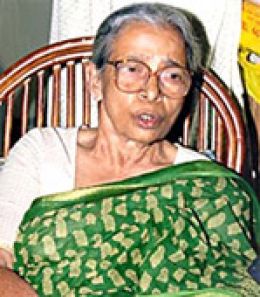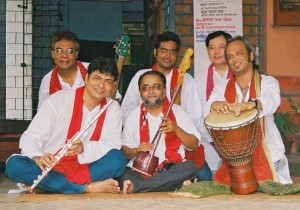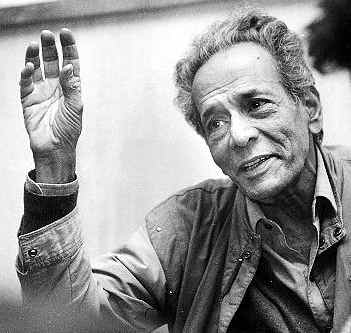 Very few theatre personalities in India have become legends in their life time. Habib Tanvir was one of them. Born as Habib Ahmed Khan on September 1, 1923 in Raipur, Chattisgarh, Habib Tanvir has reinvented Indian folk theater and brought it out on the world stage in its full glory. I still remember the evening in Calcutta when I watched his brilliant creation “Charandas Chor”. The presentation of the play in a traditional folk form looked so modern, so fresh, that I couldn’t think of anything comparable in contemporary theatre. Habib, through is work, has left a legacy that is difficult to carry on – because it demands a level of dedication that many of our modern theatre workers will fail to match. The sensitivity with which he nurtured the folk forms, experimented with content and presented them with such grace and simplicity – only a true genius can achieve such excellence.
Very few theatre personalities in India have become legends in their life time. Habib Tanvir was one of them. Born as Habib Ahmed Khan on September 1, 1923 in Raipur, Chattisgarh, Habib Tanvir has reinvented Indian folk theater and brought it out on the world stage in its full glory. I still remember the evening in Calcutta when I watched his brilliant creation “Charandas Chor”. The presentation of the play in a traditional folk form looked so modern, so fresh, that I couldn’t think of anything comparable in contemporary theatre. Habib, through is work, has left a legacy that is difficult to carry on – because it demands a level of dedication that many of our modern theatre workers will fail to match. The sensitivity with which he nurtured the folk forms, experimented with content and presented them with such grace and simplicity – only a true genius can achieve such excellence.
Habib Tanvir passed away on June 8th, 2009, but the lengend he became still lives on and inspires theatre workers all around the globe.

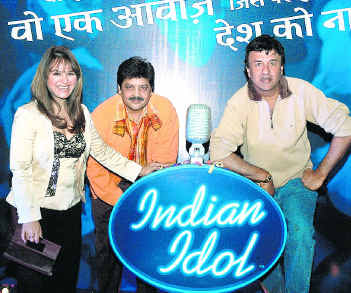 The reality TV show “American Idol” has triggered a new trend – Idol search! TV channels all over the world are searching for idols – or talents. This search is not only limited to the television screen, but it has also proliferated onto the stage in various forms. Although the primary objective of this kind of shows is to screen for talent, in reality (excuse the pun) it is nothing but an entertainment show. The excitement, the drama, and the occasional emotional outbursts, are all part of the show. Undoubtedly, such shows do bring many talented men, women and children to the limelight, but is this the right way to do explore talent? In many cases, the exploration turns to exploitation – especially for the young participants. They have to go through a grueling screening process, sustain a tremendous pressure to perform, and then handle a barrage of criticism from the celebrity judges. I know in one dance show, a young girl couldn’t take the judges criticism anymore and had a nervous breakdown resulting in a paralytic fit. In several instances the young competitors sacrifice their education to continue the show. But the tragedy is, in most cases the winner is not judged by the celebrity panel whose criticism these young participants have to encounter, but rather by the audience through cell/mobile phone text messages (SMS). And in this process, the wireless carrier mints money. I am sure the show also gets their share of this income too.
The reality TV show “American Idol” has triggered a new trend – Idol search! TV channels all over the world are searching for idols – or talents. This search is not only limited to the television screen, but it has also proliferated onto the stage in various forms. Although the primary objective of this kind of shows is to screen for talent, in reality (excuse the pun) it is nothing but an entertainment show. The excitement, the drama, and the occasional emotional outbursts, are all part of the show. Undoubtedly, such shows do bring many talented men, women and children to the limelight, but is this the right way to do explore talent? In many cases, the exploration turns to exploitation – especially for the young participants. They have to go through a grueling screening process, sustain a tremendous pressure to perform, and then handle a barrage of criticism from the celebrity judges. I know in one dance show, a young girl couldn’t take the judges criticism anymore and had a nervous breakdown resulting in a paralytic fit. In several instances the young competitors sacrifice their education to continue the show. But the tragedy is, in most cases the winner is not judged by the celebrity panel whose criticism these young participants have to encounter, but rather by the audience through cell/mobile phone text messages (SMS). And in this process, the wireless carrier mints money. I am sure the show also gets their share of this income too.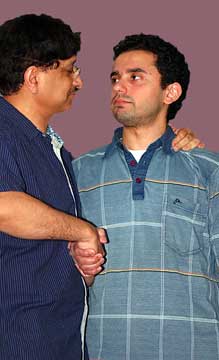
 I think it was in 2004 when I met Pranay Dutta, an AIDS activist from Calcutta who was on a world tour attending several AIDS conferences in Europe, Asia and America. Pranay Dutta was then (and I understand he still is) the secretary of Sonata Foundation, an NGO in Calcutta who was trying to spread AIDS awareness in West Bengal and India through music, documentaries and performing arts. His theory was that HIV/AIDS awareness through print media was bound to be a failure in India where the majority of the affected people are illiterate. He thought that if this message can be spread out using music and performing arts then it could have the greatest impact. During my discussions with Pranay, he told me numerous incidents of how HIV and AIDS are affecting the poor Indian population. But what struck me most was the fact that how this disease was surreptitiously spreading amongst the educated, urban middle class. He told me several incidents of well-to-do middle class families affected with HIV and their attempts to hush it up, just like the way people used to do in the early half of the twentieth century when people got infected with TB or Leprosy or something similar. The fear of social back lash was more than the disease itself. Anybody infected with HIV is immediately branded as an immoral social outcast – some one who does not have the right to exist amongst the social elite. Most middle class family consider themselves immune to HIV and think that this is only a poor man’s disease. As Pranay says in one of his
I think it was in 2004 when I met Pranay Dutta, an AIDS activist from Calcutta who was on a world tour attending several AIDS conferences in Europe, Asia and America. Pranay Dutta was then (and I understand he still is) the secretary of Sonata Foundation, an NGO in Calcutta who was trying to spread AIDS awareness in West Bengal and India through music, documentaries and performing arts. His theory was that HIV/AIDS awareness through print media was bound to be a failure in India where the majority of the affected people are illiterate. He thought that if this message can be spread out using music and performing arts then it could have the greatest impact. During my discussions with Pranay, he told me numerous incidents of how HIV and AIDS are affecting the poor Indian population. But what struck me most was the fact that how this disease was surreptitiously spreading amongst the educated, urban middle class. He told me several incidents of well-to-do middle class families affected with HIV and their attempts to hush it up, just like the way people used to do in the early half of the twentieth century when people got infected with TB or Leprosy or something similar. The fear of social back lash was more than the disease itself. Anybody infected with HIV is immediately branded as an immoral social outcast – some one who does not have the right to exist amongst the social elite. Most middle class family consider themselves immune to HIV and think that this is only a poor man’s disease. As Pranay says in one of his  I kind of like Gregory House, MD. And who doesn’t? House is one of the most popular TV shows that has catapulted Fox network to lead the popularity ratings (along with 24 and other shows). The quirky, obnoxious and ill mannered medical genius has become everybody’s dream doctor. We the New Jersey viewers specially feel his absence in real life since Gregory House works in this fictitious “Princeton-Plainsboro” hospital and to whom people come crossing the rough seas risking their lives (no pun intended) to get treated. How lucky we would have been to have such a doctor in real life. And a hospital like “Princeton-Plainsboro” where doctors do everything – they serve not only as doctors and surgeons, but they draw blood, they set up IV lines, they give the patients their pills, they feed them, they operate the MRI, CT Scan and other diagnostic machines. There are hardly any nurses or technicians. In real life hospitals, I have seen the doctors come in to visit their patient only with one objective – how soon they can leave. They spend more time in front of the computer screens looking at the charts and filling up their billing codes than with the patient. But in Princeton-Plainsboro, Dr. House’s team is like Scotland Yard, deeply engaged in finding the culprit – in this case the cause of the disease.
I kind of like Gregory House, MD. And who doesn’t? House is one of the most popular TV shows that has catapulted Fox network to lead the popularity ratings (along with 24 and other shows). The quirky, obnoxious and ill mannered medical genius has become everybody’s dream doctor. We the New Jersey viewers specially feel his absence in real life since Gregory House works in this fictitious “Princeton-Plainsboro” hospital and to whom people come crossing the rough seas risking their lives (no pun intended) to get treated. How lucky we would have been to have such a doctor in real life. And a hospital like “Princeton-Plainsboro” where doctors do everything – they serve not only as doctors and surgeons, but they draw blood, they set up IV lines, they give the patients their pills, they feed them, they operate the MRI, CT Scan and other diagnostic machines. There are hardly any nurses or technicians. In real life hospitals, I have seen the doctors come in to visit their patient only with one objective – how soon they can leave. They spend more time in front of the computer screens looking at the charts and filling up their billing codes than with the patient. But in Princeton-Plainsboro, Dr. House’s team is like Scotland Yard, deeply engaged in finding the culprit – in this case the cause of the disease. 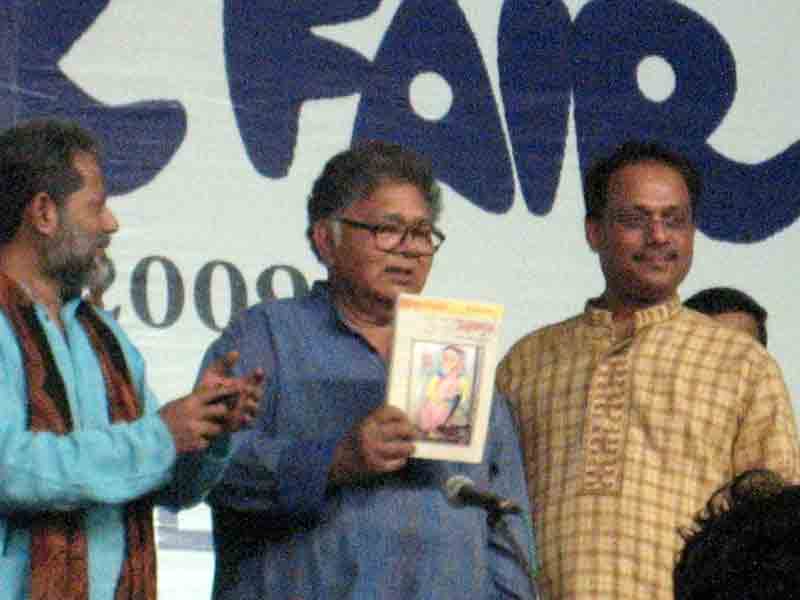 Few months ago I wrote about the debut of a new Bengali webzine, Urhalpool.com. The magazine has now reached new heights with the introduction of the first hard copy version at the 2009 Kolkata Book Fair. On Saturday 7th February 2009, at 6PM, the UBI auditorium at the Kolkata Book Fair ground was completely packed with people standing all over. Sunil Gangopadhyay introduced Urhalpool with a short speech which was followed by editor Goutam Datta talking about the vision of the magazine. The Hon’ble consul general of Italy was present on the stage along with Urhalpool’s Italian writer Alessandra Corsini. Several other contributers to the magaine like Alolika Mukherjee, Subodh sarkar, Mallika Sengupta, Pinaki Thakur, Bithi Chattopadhyay and others were present at the event. Urhalpool’s Shakti Chattopadhyay Life Time achievement in Bengali literature award (Rs25,000) was presented to Nabaneeta Dev Sen and Nirmal Chandra Gangopadhyay Sahitya puroskar was awarded (Rs15,000) to Poet Srijato. Poet Shakti Chattopadhyay’s wife Minakhi-di handed over the Shakti Chattopadhyay award and Nupur Lahiri handed over Nirmal Chandra award. The entire program was conducted by Soumitra Mitra.
Few months ago I wrote about the debut of a new Bengali webzine, Urhalpool.com. The magazine has now reached new heights with the introduction of the first hard copy version at the 2009 Kolkata Book Fair. On Saturday 7th February 2009, at 6PM, the UBI auditorium at the Kolkata Book Fair ground was completely packed with people standing all over. Sunil Gangopadhyay introduced Urhalpool with a short speech which was followed by editor Goutam Datta talking about the vision of the magazine. The Hon’ble consul general of Italy was present on the stage along with Urhalpool’s Italian writer Alessandra Corsini. Several other contributers to the magaine like Alolika Mukherjee, Subodh sarkar, Mallika Sengupta, Pinaki Thakur, Bithi Chattopadhyay and others were present at the event. Urhalpool’s Shakti Chattopadhyay Life Time achievement in Bengali literature award (Rs25,000) was presented to Nabaneeta Dev Sen and Nirmal Chandra Gangopadhyay Sahitya puroskar was awarded (Rs15,000) to Poet Srijato. Poet Shakti Chattopadhyay’s wife Minakhi-di handed over the Shakti Chattopadhyay award and Nupur Lahiri handed over Nirmal Chandra award. The entire program was conducted by Soumitra Mitra.